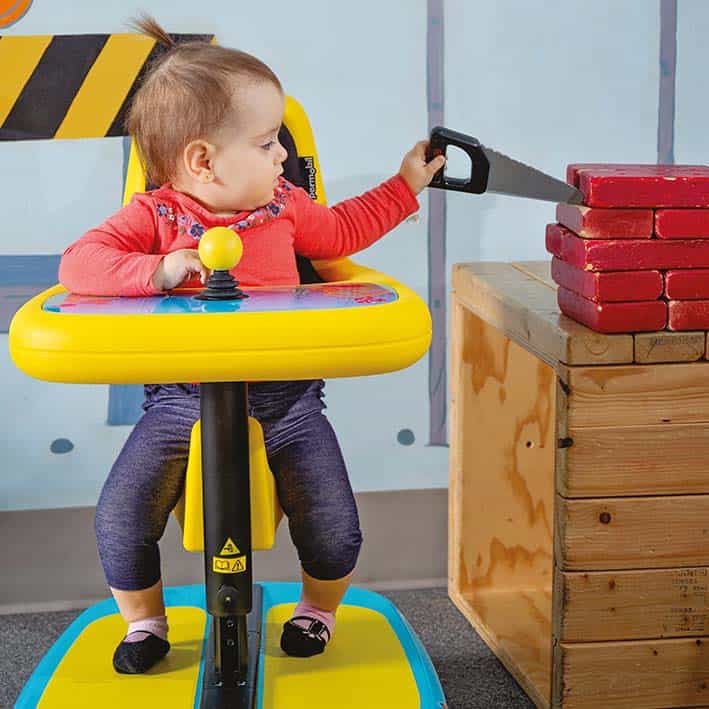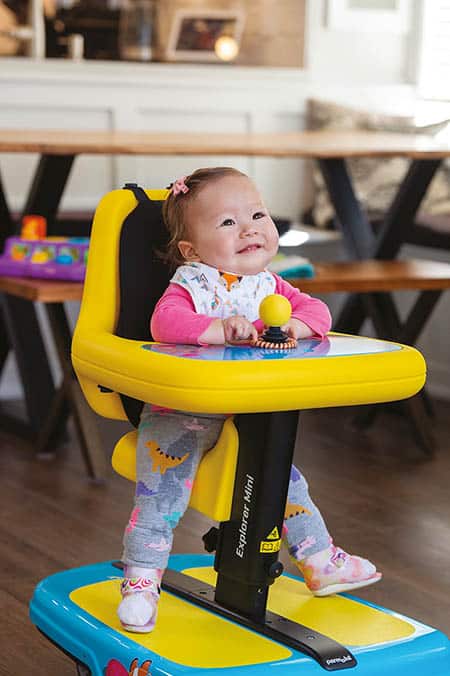Study finds paediatric powered mobility device helps toddlers develop key exploratory skills

A new study suggests that a powered mobility device to self-initiate mobility can be used as a therapeutic tool for young children with mobility impairments.
The first years for young children are crucial for development and there are few devices designed to give a young child with mobility impairments the ability to independently explore their environment while promoting developmental posture, the research outlines.
A recently published study in Physical & Occupational Therapy in Pediatrics, led by Dr Teresa Plummer of Belmont University in Tennessee, USA, looked at the driving experience and emotional responses of young children during their initial use of a new paediatric powered mobility device – the Explorer Mini from Permobil. The study included 33 children who experience mobility limitations between 6-36 months, making it the largest study of its type.
It found that young children demonstrated self-initiated mobility through the use of a powered mobility device and that the device was instrumental in promoting exploratory behaviours.
“Infants and toddlers need opportunities to explore their environment on their own. The pediatric chair helps young children develop a sense of independence and the desire to explore, learn and challenge their existing skill set,” said Dr Teresa Plummer, the lead author of the study.
“Once they discover that the world exists beyond their outstretched arm, they are set on a trajectory of rapid advancement of spatial skills, learning depth perception, directionality, and laterality. These are all essential skills for visual development, reading and understanding how they fit into the world around them. Children learn that the actions they take have power. They are their own change agent and develop a sense of self.”

While the device has all the functionality and safety considerations of a powered wheelchair, it has an age-appropriate design that is toy-like and appealing for younger users, Permobil states.
Dr Plummer continued: “We saw in the study that children intuitively interacted with the joystick. Realising this, they set out to explore places in the clinic they had never seen.
“One child found the sensory wall across the room and would not leave until he played with every item on the wall. The therapist commented that she had never seen so many “sit-to-stand” actions with this child before.”
The capacity for children to quickly grasp how to use the joystick suggests that young children should not need to show their ability to control a powered mobility device before being considered for one by their therapists.
Rather, the study finds that clinicians should consider encouraging exploratory pre-driving behaviour as a first step to learn cause and effect, cognitive and spatial skills through exploration.
“For young children, therapists have historically been limited to the use of modified power wheelchairs intended for older children or modified toy-cars,” said Karin Leire, Vice President Research & Innovation at Permobil.
“This study demonstrates that self-initiated mobility in a timely manner is now possible. The Explorer Mini enables self-initiated mobility to be a therapeutic tool in early intervention for infants. Finally, these children can explore the world independently, just like every other child.”
Permobil, which funded the study, supplies power and manual wheelchairs, seating and positioning products, and power assist devices globally.
Learn more about Permobil’s Explorer Mini paediatric powered mobility device by watching the video below:

